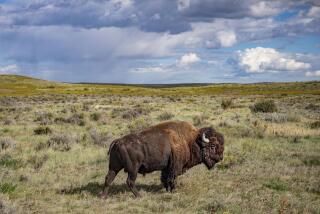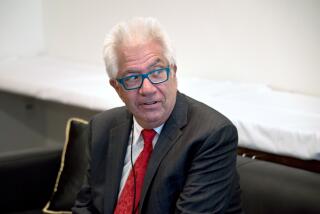A.M. Josephy Jr., 90; Chronicler of the West, Native American Saga
- Share via
Alvin M. Josephy Jr., journalist and historian who chronicled the saga of American Indians and the West, has died. He was 90.
Josephy, who was the founding board chairman of the National Museum of the American Indian in Washington, died Sunday at his home in Greenwich, Conn., of undisclosed causes.
Over his long career, Josephy wrote or co-wrote a score of books and edited a dozen more. Among the most important were “The Patriot Chiefs” in 1961, “The Indian Heritage of America” in 1968, “Red Power” in 1971, “Now That the Buffalo’s Gone” in 1982 and “The Civil War in the American West” in 1991.
“Josephy’s books elevated Indian history into a robust academic subject unencumbered by folklore or popular [white] misrepresentations,” author Michael Olmert wrote in reviewing Josephy’s 2000 memoir, “A Walk Toward Oregon,” for the Washington Post.
The well-received memoir was praised by Los Angeles Times reviewer Anthony Day, the former editor of The Times’ editorial pages, who wrote: “In uncommonly vivid prose, he recounts for us ... a life lived with much gusto and zest during a time of tumult, change and great achievements in the life of America and its people.”
Josephy, who built a retreat and research base in eastern Oregon, also won the admiration of the Nez Perce and other Indian tribes he interviewed and researched.
George P. Horse Capture, in reviewing “Now That the Buffalo’s Gone” for The Times in 1982, praised the historian for his “constant exposure to the Indian people” and for accurately depicting the Native American experience through “tribal oral histories, first person accounts, historical and anthropological works.”
Josephy, born into affluence in Woodmere, N.Y., and brought up in New York City, became fascinated with the West as a child. A self-taught historian, he was forced to drop out of Harvard when the Depression caused a downturn in family fortunes.
The youth drove across the country to Hollywood, where he briefly became a screenwriter -- a job he would return to from 1945 to 1951 at MGM. His best-known film was 1952’s “The Captive City,” starring John Forsythe as a crusading small-city newspaper editor. The screenplay was based on Josephy’s experiences at the now-defunct Santa Monica Independent in exposing Mafia encroachment into the area.
In 1937, Josephy became a correspondent for the New York Herald-Tribune, interviewing Russian revolutionary Leon Trotsky in exile in Mexico City. He also worked in the late 1930s for the Mutual radio network at New York’s WOR as director of news and special features.
When World War II began, Josephy went to Washington to work in the Office of War Information.
He later served as a Marine war correspondent in the Pacific, earning a Bronze Star.
The first book he co-authored was “The U.S. Marines on Iwo Jima” in 1945, and his first solo effort was “The Long and the Short and the Tall: The Story of a Marine Combat Unit in the Pacific” in 1946 (reprinted in 2000).
Josephy worked for Time magazine from 1951 to 1960, where he developed his interest in Indian history. He was with American Heritage Publishing from 1960 to 1979, rising to editor in chief.
Josephy, who had long been irked that the story of the Meriwether Lewis and William Clark expedition had never been told from the viewpoint of the Indians, most recently edited an anthology, “Lewis and Clark Through Indian Eyes.” The book is scheduled for publication next year by Knopf, the publishing house founded by his maternal uncle, Alfred A. Knopf.
Divorced from his first wife and widowed by his second, Josephy is survived by four children, Diane Josephy Peavey, Allison Wolowitz, Katherine Josephy and Alvin M. Josephy III; a brother, Warren; eight grandchildren; and a great-grandson.
More to Read
Sign up for our Book Club newsletter
Get the latest news, events and more from the Los Angeles Times Book Club, and help us get L.A. reading and talking.
You may occasionally receive promotional content from the Los Angeles Times.










